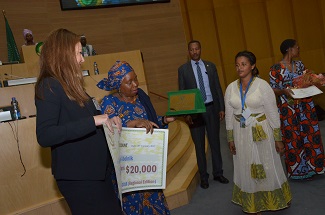Posted on February 09, 2017
'It is a great honour! It only really sunk in when I was receiving the award at the African Union (AU) headquarters in Addis Ababa. Women from all over Africa who were attending the Gender Pre-summit wanted to take photos with us. It really hit home then that we are role models. It is simultaneously humbling and a great burden of responsibility, because the AU expects us to be their ambassadors and to continue encouraging young girls to become scientists,' said Dr Celia Abolnik, Associate Professor and Research Chair in Poultry Health and Production in the Department of Production Animal Studies at the University of Pretoria (UP), after being named one of Africa's top five female scientists during the African Union Kwame Nkrumah Scientific Awards at the AU headquarters in Addis Ababa on 24 January 2017. The other four laureates hail from Kenya, Mali, Nigeria and Tunisia.
The African Union Kwame Nkrumah Scientific Awards are named after Ghana's first President and celebrated Pan-Africanist, Dr Kwame Nkrumah and recognises female scientists at national, regional and continental levels as part of the AU's commitment to supporting the use and development of science in Africa. The award ceremony, which has been sponsored by the European Union since 2009, took place during the opening ceremony of the 28th AU Heads of States and Government Assembly's Gender Pre-Summit in Ethiopia.
 |
 |
Dr Abolnik was nominated by the Department of Research and Innovation Support at UP based on her work on avian respiratory viruses, especially those that affect chicken and ostrich production in Africa. She explains that her many years of collaboration in disease research with postgraduate students and scientists in Mozambique, Zambia, Zimbabwe, Sudan and Nigeria probably counted in her favour.
Dr Abolnik sees the award as a reflection of her hard work and resilience. She says that her motto in life is 'never give up' and adds that there is no secret formula to success: 'Aim high and work hard, and then harder still. Resilience is very important. Things will go wrong in the lab; pause, regroup and press on.' She maintains that 'integrity is a key personality trait' and encourages prospective students to consider a career in science. 'You do not have to get straight As in matric or a distinction in mathematics to pursue a scientific career,' she says. 'The key is finding a subject that you are passionate about and giving it your all. For me, it was Virology, and I only realised that in the third year of my BSc studies at university. Passion and determination will achieve just as much, if not more than an exceptional IQ.'
Her advice to young scientists is to pick a field where their research will be relevant: 'The reality is that our planet's population is growing at an alarming rate and we have to come up with innovative ways to deal with the consequences of more people: more waste, more disease, and less food.'
Dr Abolnik would like to be remembered for her contribution to research on avian disease that puts South Africa on the map and improves food security in a sustainable and responsible manner.
Copyright © University of Pretoria 2025. All rights reserved.
Get Social With Us
Download the UP Mobile App